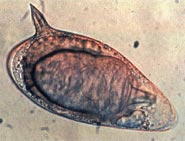
Genetic diversity and population structure analyses based on microsatellite DNA of parthenogenetic Fasciola flukes obtained from cattle and sika deer in Japan.
Sign Up to like & getrecommendations! Published in 2021 at "Parasitology research"
DOI: 10.1007/s00436-021-07061-7
Abstract: Understanding the population structure of Fasciola flukes in domestic and wild animals is important for determining the extent of cross-infection between them. Although the parthenogenetic Fasciola flukes in Japan have been shown to comprise five… read more here.
Keywords: fasciola; parthenogenetic fasciola; microsatellite dna; population structure ... See more keywords

A novel Thioredoxin-related protein 14 from Fasciola gigantica has an immunodiagnostic potential for fasciolosis.
Sign Up to like & getrecommendations! Published in 2020 at "Acta tropica"
DOI: 10.1016/j.actatropica.2020.105471
Abstract: In the definitive host, a trematode parasite can survive and evade the damage by reactive oxygen species that are generated from its metabolism and the host immune cells. Several anti-oxidant proteins are found in Fasciola… read more here.
Keywords: fasciola; gigantica; thioredoxin related; thioredoxin ... See more keywords

Development of multi-epitope driven subunit vaccine against Fasciola gigantica using immunoinformatics approach.
Sign Up to like & getrecommendations! Published in 2019 at "International journal of biological macromolecules"
DOI: 10.1016/j.ijbiomac.2019.07.024
Abstract: Fascioliasis, a serious helminth disease of the livestock population, results from infection with the parasite Fasciola. Despite the alarming increase in drug resistance, a safe and fully effective vaccine for fascioliasis is still not available.… read more here.
Keywords: fasciola; gigantica; subunit vaccine; vaccine ... See more keywords

Revealing genetic hybridization and DNA recombination of Fasciola hepatica and Fasciola gigantica in nuclear introns of the hybrid Fasciola flukes.
Sign Up to like & getrecommendations! Published in 2018 at "Molecular and biochemical parasitology"
DOI: 10.1016/j.molbiopara.2018.06.004
Abstract: Fasciola hepatica and F. gigantica are ruminant liver flukes that are found worldwide. They can occur sympatrically and hybridize, consequently producing an intermediate form (Fasciola sp.), especially in Africa and Asia. The bridge intron (TkBridgeInt)… read more here.
Keywords: fasciola; genetic hybridization; fasciola hepatica; hepatica ... See more keywords

Molecular characterization and phylogenetic analysis of Fasciola gigantica from Nigeria.
Sign Up to like & getrecommendations! Published in 2017 at "Parasitology international"
DOI: 10.1016/j.parint.2016.10.010
Abstract: Fasciola gigantica is considered the major pathogen causing fasciolosis in Africa; however, molecular characterization of this fluke has not been adequately elucidated. It is important to scientifically elucidate the dispersal history of F. gigantica by… read more here.
Keywords: molecular characterization; fasciola; gigantica; fasciola gigantica ... See more keywords

Genetic diversity and multiplicity of infection in Fasciola gigantica isolates of Pakistani livestock.
Sign Up to like & getrecommendations! Published in 2020 at "Parasitology international"
DOI: 10.1016/j.parint.2020.102071
Abstract: Fasciola spp. are responsible for over 3 billion US dollars of production loss annually in livestock and cause widespread zoonotic disease. Nevertheless, understating of the emergence and spread of the trematode species is poor. The… read more here.
Keywords: multiplicity; fasciola; gigantica; genetic diversity ... See more keywords

Genetic diversity of Fasciola hepatica in Spain and Peru.
Sign Up to like & getrecommendations! Published in 2020 at "Parasitology international"
DOI: 10.1016/j.parint.2020.102100
Abstract: In the present study, molecular characterization of Fasciola flukes from Spain was performed to reveal the relation with the previously reported Peruvian F. hepatica population. The nuclear DNA markers, phosphoenolpyruvate carboxykinase (pepck) and DNA polymerase… read more here.
Keywords: fasciola; genetic diversity; hepatica; fasciola flukes ... See more keywords

Identification of new polymorphic positions in rDNA sequences of the "intermediate" Fasciola forms.
Sign Up to like & getrecommendations! Published in 2022 at "Parasitology international"
DOI: 10.1016/j.parint.2022.102555
Abstract: Fascioliasis is a foodborne zoonotic disease generally caused by the parasitic flukes Fasciola gigantica and Fasciola hepatica in class Trematoda. An "intermediate" Fasciola forms between F. gigantica and F. hepatica has been shown to exist.… read more here.
Keywords: fasciola; gigantica hepatica; fasciola forms; new polymorphic ... See more keywords

Fasciola hepatica products can alter the response of bovine immune cells to Mycobacterium avium subsp.paratuberculosis
Sign Up to like & getrecommendations! Published in 2020 at "Parasite Immunology"
DOI: 10.1111/pim.12779
Abstract: Fasciola hepatica causes economically important disease in livestock worldwide. The relevance of this parasitic infection extends beyond its direct consequences due to its immunoregulatory properties. read more here.
Keywords: fasciola; fasciola hepatica; hepatica products; products alter ... See more keywords

Complex and dynamic transcriptional changes allow the helminth Fasciola gigantica to adjust to its intermediate snail and definitive mammalian hosts
Sign Up to like & getrecommendations! Published in 2019 at "BMC Genomics"
DOI: 10.1186/s12864-019-6103-5
Abstract: BackgroundThe tropical liver fluke, Fasciola gigantica causes fasciolosis, an important disease of humans and livestock. We characterized dynamic transcriptional changes associated with the development of the parasite in its two hosts, the snail intermediate host… read more here.
Keywords: fasciola; dynamic transcriptional; fasciola gigantica; snail ... See more keywords

Assessing the performance of a Fasciola gigantica serum antibody ELISA to estimate prevalence in cattle in Cameroon
Sign Up to like & getrecommendations! Published in 2019 at "BMC Veterinary Research"
DOI: 10.1186/s12917-018-1762-z
Abstract: BackgroundCattle rearing in Cameroon is both economically and culturally important, however parasitic diseases detrimentally impact cattle productivity. In sub-Saharan Africa bovine fasciolosis is generally attributed to F. gigantica, although understanding of Fasciola species present and… read more here.
Keywords: fasciola; gigantica; antibody elisa; performance ... See more keywords